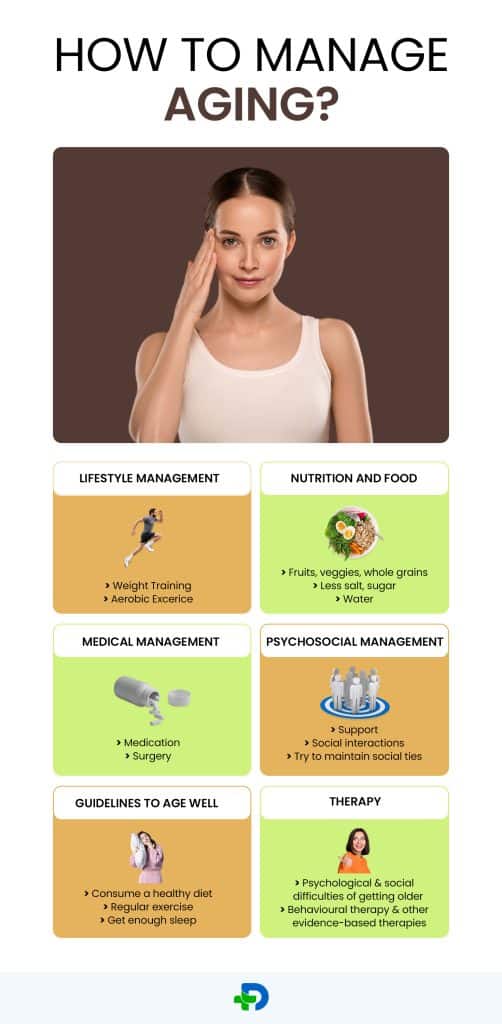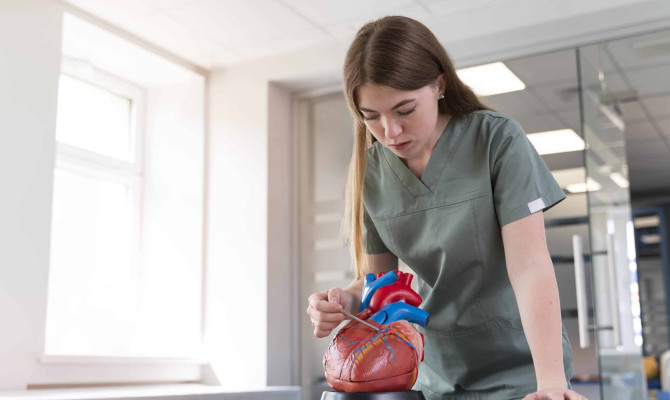Aging: Understanding the process, challenges and management

- Aging
- 14 Aug 2023
Overview
Overview
All life forms experience the normal and inevitable process of ageing. Understanding the ageing process is essential for people, healthcare professionals, and policymakers as it helps them develop strategies to promote healthy ageing and address the associated challenges.
Our bodies change as we age, so these changes have an impact on how well we perform physically, mentally, and socially.
The body’s physiological functions gradually deteriorate over time due to ageing. Organ performance, cognitive skills, and social interactions hampers over time.
While aging is a natural process, environmental variables like lifestyle decisions, social support, and healthcare access can also impact it. 1Overview | Researched based study from nih.gov

Importance
Importance of understanding aging
- Aging greatly increases the chance of developing a number of chronic diseases, such as diabetes, heart disease, and cancer.
- Second, the world’s elderly population is expanding quickly. According to the UN, there will be 2.1 billion people in the world who are 60 years of age or older by 2050.
- Creating effective policies and initiatives that support healthy ageing and encourage social inclusion requires an understanding of the ageing process.
Process
How does the ageing process work?
The physical and mental changes as we age can substantially affect our general health and well-being. These alterations can take place on a wide range of scales, from modifications at the cellular and organ levels to alterations at the psychological and social groups.
We can take preventative measures to preserve our health and quality of life as we age if we have a thorough knowledge of the ageing process and its effects.
Biological changes
Cellular level changes
- Our bodies experience various cellular changes as we age. Due to these modifications, our bodies’ cell count and functional capacity may decrease. This can lead to health problems, including a weakened immune system, reduced ability to repair DNA damage and a greater risk of developing chronic diseases like cancer.
Organ level changes
Cardiovascular system
- As you get older, your heart’s efficiency declines.
- Your vessels stiffen.
- Your blood pressure rises, causing hypertension.
Bone changes
- As bone mass declines, they could weaken.
- After menopause, bone density decline in women accelerates.
- Inadequate calcium absorption from the food, leading to decrease in calcium and Vitamin D.
- The sliding motion of joints is impacted.
Changes in muscles
- Around 30, muscle mass and power decline.
- Muscle may become rigid and lose its tone.
- Decrease in strength.
Vision and hearing changes
- Damage to the inner ear or nerve paths can lead to cataracts, glaucoma, hearing loss, etc.
Changes on skin
- Skin gets thinner, less elastic and fragile.
- More prone to damage.
- Produces less sebum, making it dry and prone to wrinkles.
Cognitive-decline
Age-related cognitive decline and psychological changes
Changes in memory
- Memory loss, as well as a general slowdown in mental working speed.
- Severe cognitive decline can significantly impact the quality of life.
Changes in language and communication
- Aging can also impact language and communication.
- Having trouble remembering words or expressing themselves.
- Changes in problem-solving and decision-making skills.
- Some people may find it more difficult to solve complex problems or make tough choices.
Emotional changes
- Likelihood of developing melancholy, anxiety, and other mental health issues.
- Long-term health problems, social seclusion, and alterations in brain chemistry.
Social changes
- This is one of the most significant societal shifts that can support ageing in retirement. Even though it can be a welcome relief for some people, retirement can cause boredom, loneliness, and a loss of purpose.
- Older people must find ways to stay active in their communities through volunteer work, a pastime, or social activities.
- The last but not most negligible factor in healthy ageing is social support. People with strong social connections report higher levels of happiness and health, in contrast to social isolation. 2Process of aging | Researched based study from nih.gov
Challenges
What are the challenges of aging?
Health challenges
- Chronic diseases like diabetes, heart disease, and cancer are more common.
- Immune system decline.
- Decline in physical functioning as they age, making it challenging to carry out everyday tasks.
- A person’s quality of life, social connections, and financial stability can all be impacted by a disability.
Financial challenges
- Financial difficulties are a significant worry for older people, especially those who haven’t saved enough for retirement.
- Older adults may need assistance with everyday living tasks, which can be expensive, and healthcare costs can be high. Ageism and discrimination can also harm older adults’ access to healthcare and job opportunities.
- An individual’s mental and physical health, social connections, and financial security may all be impacted by retirement, which is a major social transition.
- Retirement-related income declines may affect a person’s ability to meet financial requirements. It may also weaken social contacts, impacting a person’s mental and bodily well-being.
Social challenges
- Older adults living alone or with few social connections may experience social challenges. For older people, loneliness is a serious issue because it can result in melancholy, anxiety, and other mental health issues.
- A person’s physical well-being can be impacted by social isolation, which increases the chance of chronic illness, disability, and mortality.
- Older people often worry about ageism and discrimination, especially in the workplace and medical environments. Employers may assume that older adults’ access to healthcare and the standard of care they receive due to ageism can harm their job prospects. 3Challenges of aging | Researched based study from who.int
Management

How to manage aging?
Lifestyle Management
Exercise
- Exercise and physical activity are crucial for good ageing and should be done regularly.
- It is advised to engage in muscle strengthening activity and at least 150 minutes of moderate-intensity aerobic exercise per week.
Skincare
- Moisturize your skin
- Do not skip sunscreen
- Use anti-aging skincare products.
Limit alcohol
- Quit smoking and reduce alcohol consumption for healthier aging.
Optimum sleep
- Get enough sleep as it can reduce the risk of many chronic diseases such as depression, obesity, stroke etc.
- Set a regular sleep schedule and a goal of 7-8 hours per night.
Nutrition
- Fruits, veggies, whole grains, lean protein, and low-fat dairy products should all be included.
- Less salt, sugar, added sugar, and saturated and trans fats should be consumed.
- Have adequate water. 4Management of aging| Researched based study from nih.gov
Medical Management
Medication
- Using medicine to manage the ageing process can be fundamental. Individuals may require medication to manage chronic conditions like diabetes, heart disease, and high blood pressure.
- Older patients should take medication precautions, as they may be more vulnerable to adverse effects and drug interactions. 5Management of aging | Researched based study from nih.gov
Surgery
- Surgery may be required for some older individuals’ medical conditions. Although older people may have underlying medical conditions that increase their risk of complications, surgery can still be risky for them. Therefore, senior patients and their medical professionals should carefully weigh the advantages and disadvantages of surgery.
Psychosocial Management
Support
- Maintaining social ties with family and friends can reduce loneliness and depression and enhance general well-being.
Therapy
- Professional counselling and therapy can also be beneficial.
- Managing these conditions in older people has been successful with cognitive behavioral therapy and other evidence-based therapies. 4Management of aging| Researched based study from nih.gov
Guidelines
Guidelines to age well:
Although it may bring its own difficulties, ageing is a natural part of life, and there are many methods to ensure you age well. Taking care of your body and mind, remaining active, and being involved in life are all critical components of ageing. Here are some guidelines for ageing well:
- Maintaining a healthy lifestyle: It is crucial for preserving health and preventing illness.
- Keep your brain active: Reading, completing puzzles, and learning new skills are all excellent methods to sustain brain health. Practice meditation, yoga, etc. for mindfulness and healthy living.
- Health prevention: Healthy ageing depends on health prevention. It is necessary to get regular check-ups, screenings, and vaccinations.
- Keep a positive outlook: It will help you deal with life’s obstacles and enhance your general well-being.
Any feedback on this article?
 This Articles content was accurate
This Articles content was accurate Very Informative Article
Very Informative Article I have a question or a comment
I have a question or a comment
 This article contains inaccurate content
This article contains inaccurate content This article was not helpful
This article was not helpful I have a question or a comment
I have a question or a comment
We appreciate your helpful feedback!
Checkout our social pages
References
-
National Institutes of Health
The Aging Population in the Twenty-First Century: Statistics for Health Policy.
-
National Institutes of Health
Age-Related Physiological Changes and Their Clinical Significance/Process
-
World Health Organization
Ageing and health/factsheet/Challenges of aging
-
National Institutes of Health
Challenges to Aging in Place: Understanding Home Maintenance Difficulties/Behavioral therapy
-
National Institutes of Health
Management of elderly patients/Medical Management






































